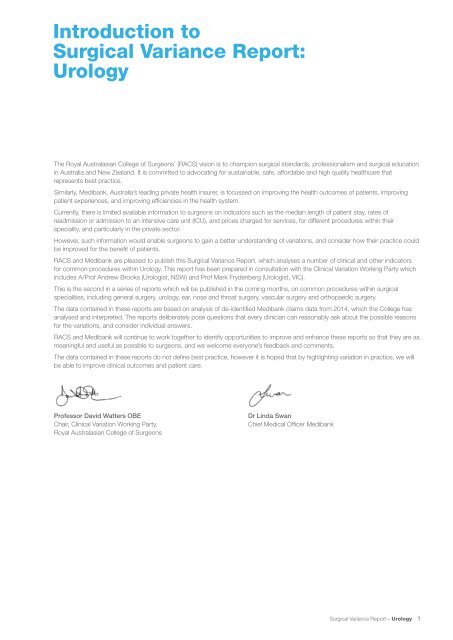Surgical Variance Report Urology
16046_RACS-Urology-Report_web_FA
16046_RACS-Urology-Report_web_FA
Create successful ePaper yourself
Turn your PDF publications into a flip-book with our unique Google optimized e-Paper software.
Introduction to<br />
<strong>Surgical</strong> <strong>Variance</strong> <strong>Report</strong>:<br />
<strong>Urology</strong><br />
The Royal Australasian College of Surgeons’ (RACS) vision is to champion surgical standards, professionalism and surgical education<br />
in Australia and New Zealand. It is committed to advocating for sustainable, safe, affordable and high quality healthcare that<br />
represents best practice.<br />
Similarly, Medibank, Australia’s leading private health insurer, is focussed on improving the health outcomes of patients, improving<br />
patient experiences, and improving efficiencies in the health system.<br />
Currently, there is limited available information to surgeons on indicators such as the median length of patient stay, rates of<br />
readmission or admission to an intensive care unit (ICU), and prices charged for services, for different procedures within their<br />
speciality, and particularly in the private sector.<br />
However, such information would enable surgeons to gain a better understanding of variations, and consider how their practice could<br />
be improved for the benefit of patients.<br />
RACS and Medibank are pleased to publish this <strong>Surgical</strong> <strong>Variance</strong> <strong>Report</strong>, which analyses a number of clinical and other indicators<br />
for common procedures within <strong>Urology</strong>. This report has been prepared in consultation with the Clinical Variation Working Party which<br />
includes A/Prof Andrew Brooks (Urologist, NSW) and Prof Mark Frydenberg (Urologist, VIC).<br />
This is the second in a series of reports which will be published in the coming months, on common procedures within surgical<br />
specialities, including general surgery, urology, ear, nose and throat surgery, vascular surgery and orthopaedic surgery.<br />
The data contained in these reports are based on analysis of de-identified Medibank claims data from 2014, which the College has<br />
analysed and interpreted. The reports deliberately pose questions that every clinician can reasonably ask about the possible reasons<br />
for the variations, and consider individual answers.<br />
RACS and Medibank will continue to work together to identify opportunities to improve and enhance these reports so that they are as<br />
meaningful and useful as possible to surgeons, and we welcome everyone’s feedback and comments.<br />
The data contained in these reports do not define best practice, however it is hoped that by highlighting variation in practice, we will<br />
be able to improve clinical outcomes and patient care.<br />
Professor David Watters OBE<br />
Chair, Clinical Variation Working Party,<br />
Royal Australasian College of Surgeons<br />
Dr Linda Swan<br />
Chief Medical Officer Medibank<br />
<strong>Surgical</strong> <strong>Variance</strong> <strong>Report</strong> – <strong>Urology</strong> 1


